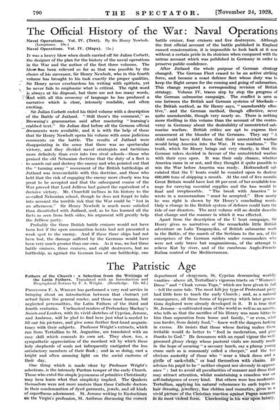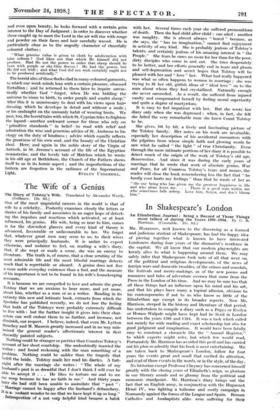The Patristic Age
Fathers of the Church : a Selection from the Writings of the Latin Fathers. Translated with an Introduction and Biographical Notices by F. A. Wright. (Routledge. 12s. 6d.)
PROFESSOR F. A. WRIGHT has performed a very real service in bringing about an introduction between that abstract yet actual figure the general reader, and those most human, but neglected personalities, the Latin Fathers of the third and fourth centuries. Unclassical readers of Prebendary Mackay's Saints and Leaders, with its vivid sketches of Cyprian, Jerome, and Ambrose, will be glad to find here just what is needed to fill out his-pictures, and give some further first-hand acquain- tance with their subjects. Professor Wright's extracts, which run from Tertiillian to St. Augustine, are translated with an easy skill .which Conceals its own art. They show, too, a sympathetic appreciation of the mordant wit by which these holy shepherds of souls not infrequently castigated the less satisfactory members of their flock ; and in so doing,- cast a bright and often amusing light on the social customs of their day.
One thing which is made elear by Professor Wright's selections, is the intensely Puritan temper of the early Church. Those-who extol the simple joyousness of primitive Christianity may here learn what that simplicity implied. The Quakers themselves were not more austere than these Catholic doctors in their condemnation of dyed garments, jewels, and all kinds of superfluous adornment. St. 'Jerome writing to Eustochium on the Virgin's profession, St. Anibrose discussing the correct deportment of clergymen, St. Cyprian denouncing worldly vanities—above all, Tertullian's vigorous tracts on " Women's Dress " and " Cloak versus Toga," which are here given-in full —tell the same tale. The most kill-joy type of Protestant piety had little here to teach the early Church ; and, as a natural consequence, all those forms of hypocrisy which later genera- tions deplored were already developed in ft. It is true that St. Jerome—a cultivated man of the world as well as an ascetic, who tells us that the sacrifice of his library was more bitter to him than separation from home and family, " or even, what ivas harder, from dainty food,"—knew well the dangers lurking in excess. He insists that those whose fasting makes them irritable would do better to " feed in moderation, and give thanks to God." He denounces with an equal' vigour the well- groomed glossy clergy whose pastoral visits are Mostly made in the hope of securing " a savoury hinch; say a plump -young crane such as is commonly 'called cheeper," and the too obVions austerity of those who " wear a black dress and a girdle of sack-cloth," or load themselves with Chains. He advises his Pupil to be " neither elegant nor slovenly in appear- ance " ; but to avoid all peculiarities Of manner and dress that may attract attention, whilst maintaining a ceaseless war on self-indulgence of every kind. But others were less Tertullian, applying his -natural vehemence to such topics as hair dressing, jewellery,-fine clothes and eosnreties, -gives' Us a vivid picture of the Christian reaction against Phgan manile!'s moderate. its most violent forni: Unrelenting in his war upon luxury,
and even upon beauty, he looks forward with a certain grim interest to the Day'of JudgMent ; in order to discover whether those caught up to meet the Lord in the air will rise with rouge and powder on their faces and hair carefully waVed. He is partidularly clear as to the ungodly character of cheerfully coloured clothes :
" What genuine value IS giVen to cloth by adulteration with false colours"? -God likes not that whiCh Ho himself did not produce. Had He not the power to order that sheep should be horn with purple or sky-blue fleeces ? He had the power, but He did not wish'; and what God did not wish eel:WS-21y ought not to be produced artificially." • The horrid ideacif these floeica Clad in many-coloured garments, to which bur Weak minds lean with a certain pleasure, 'obsessed Tertullian -arid he returned to them later to inquire sarcas- tically whether God " forgot,' when Ile was bidding the universe to'bOrne to birth, 'to order purfile and scarlet sheep."
After this it is unnecessary to deal with his views upon hair dressing, which he-develops in detail and • without a smile ; or his onslaught Ontlie unmanly habit -of wearing boots. We pasS; too, the hOrridtales-with which St. Cyprian tries to frighten the lapsed—another awkward corner for- those who rely- on " primitiVe Standards " in belief—AO read with relief and admiration the wiseand generous advice'of St. Ainbrose to' his clergy -on the duty of kindness ; advice which equally reflects flie greatness:6f his own mail, and the 'beauty of the Christian ideal. Here,- and again 'in the noble- story of the Virgin of Antioch, in St. Jerome's account of the life of the Egyptian monasteries; and the lovely tale of- Malthus which he wrote in- his old age at Bethlehem, the Church of the Fathers shows itself to us in its heroic aspect ; and the imperfections of the lantern are forgotten in the radiance of the Supernatural



















































 Previous page
Previous page